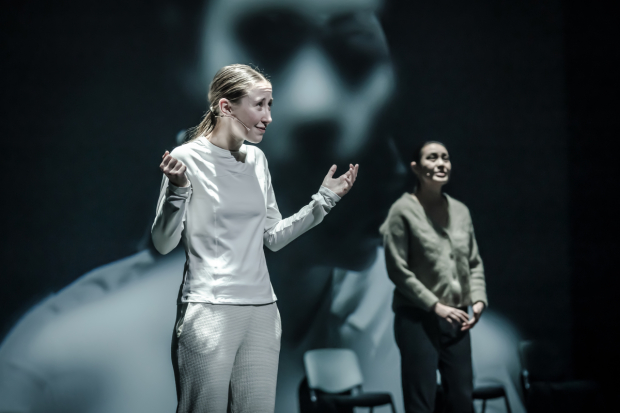Review: Crave (Chichester Festival Theatre)
Tinuke Craig directs a new revival of Sarah Kane’s play

© Marc Brenner
In her filmed backstage introduction to the digital version of this live performance of Sarah Kane's
Crave, the director Tinuke Craig described her own first encounter with the work – her sense that she didn't understand everything that was going on, but she was utterly compelled and engrossed.
That's about right. This, the fourth of the five plays that Kane wrote in her tragically short life, is an
allusive poem as much as it is a play, with its four characters – described only by a letter of an
alphabet – speaking into the void, telling stories that may or may not intertwine, describing moods that veer from bleakest black to vaguely hopeful.
Dark themes are hinted at but never made explicit: rape, anorexia, suicide, paedophilia, and murder are all mentioned. The characters may be in an institution of some sort; certainly, all are mentally fragile, struggling to come to terms with trauma, trying to rise above despair. The first line, emerging from darkness is "You're dead to me" and the final phrase is "happy and free" but what passes in the 50-minutes between varies from an almost rapturous description of love to a depiction of a self-loathing so deep that it is as if the character is being consumed by white maggots.
A box full of darkness can also be a gift
But what's astonishing, what holds and grips, is the power of the writing, the way its structure is
almost choric, with its moments of biblical and poetic allusion tied together by the sense of emotion and words washing across the stage. There's an extraordinary moment where a repeated no/yes, passing between the actors, culminates in a series of screams, as if sound and thought have become entwined. Its musicality, the way words float like notes, and phrases of longing for resolution rise into the light, means its meaning is always sensed rather than grasped, felt rather than reached.
All of this is beautifully managed in Craig's production, designed by Alex Lowde to set the four actors on four socially-distanced and slowly moving travellators, so they are forced to walk forwards all the time; when they stop they are pushed back to the beginning. The stylised movement, by Jenny Ogilvie, is perfectly choreographed. At times, the whole set goes spinning under Joshua Pharo's sharply delineated light; behind the actors Ravi Deepres's filmed images rise and engulf them (online, they are like smoky ghosts). Anna Clock's compositions and sound design contrast metallic sound and music with passages of silence.
It all serves to reinforce and – literally – illuminate the pain and joy expressed within this haunting
piece. The performances are equally controlled yet agonising, finding the nuances of feeling that
Kane's carefully calibrated words evoke. Erin Doherty's pain sometimes feels unbearable; Jonathan Slinger finds joy in his easy evocation of love; Wendy Kweh and Alfred Enoch are equally strong.
You'd think, given the general misery we are all facing at present, that so bleak a play would hit the wrong mood. But Kane's strength lies in her ability to look horror in the eye and yet to find some consolation. She understood – as a quote in the programme suggests – that a box full of darkness can also be a gift. The fact that the Chichester Festival Theatre has only been able to perform to live audiences for a few days before lockdown and isolation once again fall adds to the poignancy of the production; fortunately, you can stream it from home until Saturday 7 November. You may not understand precisely what it all means, but you will know it speaks to us all.












